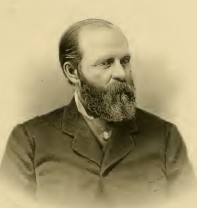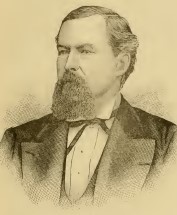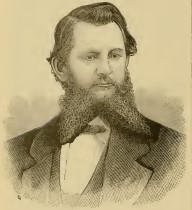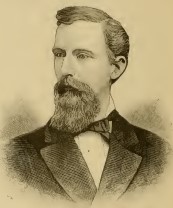|
 HON. GEORGE G. BLAIR ------Was born in
Bedford County, Pennsylvania, August 31, 1845. When nine
years of age his parents removed to Clark County, Iowa,
where he remained until July, 1863. Enlisting then in
the Eighth Iowa Cavalry he soon found himself in
Tennessee, and during the two years he was in the army
he saw some hard service and was constantly in active
duty. At
the end of two years he returned to Iowa, and applied
himself to farming in that State and in Missouri until
the year 1868. HON. GEORGE G. BLAIR ------Was born in
Bedford County, Pennsylvania, August 31, 1845. When nine
years of age his parents removed to Clark County, Iowa,
where he remained until July, 1863. Enlisting then in
the Eighth Iowa Cavalry he soon found himself in
Tennessee, and during the two years he was in the army
he saw some hard service and was constantly in active
duty. At
the end of two years he returned to Iowa, and applied
himself to farming in that State and in Missouri until
the year 1868.
In that year he migrated to the State of
Nevada, and became interested in mining in White Pine
County. Seeing in that occupation great possibilities of
success, he has faithfully continued to give his time
and energies to the development of the mining interests
in that county, meeting with the changing success which
usually attends that business. Mr. Blair resides in
Osceola, and is the proprietor of the Osceola Mine, from
which the district takes its name.
In 1880 he was
elected a member of the Assembly, to represent in that
body the Democratic Party, and to aid in advancing the
general welfare of the State in which he is so truly
interested. Mr. Blair is a descendant of a staunch old
family so long and favorably known throughout the middle
and western counties of that famous old Commonwealth,
that his name will sound familiar to roost of the large
number hailing from the Keystone State who have settled
in this western country.
 A. C. CLEVELAND
-----The subject of the following sketch is a native of
the State of Maine, and was born at Skowhegan, Somerset
County. He remained in his native State until he reached
the age of seventeen. During his life there he acquired
a fair education, and in January, 1858, started for
California on the steamer Star of the West, the boat
that was the first fired upon by the rebels during the
war of the Rebellion. Upon reaching the Pacific Coast,
Mr. Cleveland engaged in mining in Tuolumne and
Calavaras Counties, until 1862 when he went to Plumas
County and engaged in the stock business. In May, 1863,
he crossed the mountains to Nevada, and located in
Virginia City. His business at that place was
principally mining. In 1865 he went to Washoe County and
engaged in the lumber trade. He was one of the first to
build a V flume for the purpose of conducting wood and
timber down from the mountains, having had one in
operation as early as 1868, at Simonds' place on Simonds
Creek, at the head of Little Valley, near Lakeview
Station. This flume was two and one-quarter miles in
length. In
1866, Mr. Cleveland was elected a Commissioner for
Washoe County, and was a delegate to the State
Convention that year, and during a contest before that
body, between the Winters and the Blaisdel delegations
from Storey County, Mr. Cleveland was a member of the
committee that decided the matter, and held the deciding
vote. This he cast for Blaisdel, in strict conjunction
with his instructions by the County Convention, he
having pledged himself to do so, although Winters was
his special friend and employer, and pecuniary benefits,
as well as threats, were used to deter him from doing
so. It was threatened that the patronage of the
Kentuck Mining Company would be taken away from him
unless he disobeyed his instructions, but he stood firm,
and consequently lost their patronage. General Clark
says of him: "His word is of more value to him than
money." A. C. CLEVELAND
-----The subject of the following sketch is a native of
the State of Maine, and was born at Skowhegan, Somerset
County. He remained in his native State until he reached
the age of seventeen. During his life there he acquired
a fair education, and in January, 1858, started for
California on the steamer Star of the West, the boat
that was the first fired upon by the rebels during the
war of the Rebellion. Upon reaching the Pacific Coast,
Mr. Cleveland engaged in mining in Tuolumne and
Calavaras Counties, until 1862 when he went to Plumas
County and engaged in the stock business. In May, 1863,
he crossed the mountains to Nevada, and located in
Virginia City. His business at that place was
principally mining. In 1865 he went to Washoe County and
engaged in the lumber trade. He was one of the first to
build a V flume for the purpose of conducting wood and
timber down from the mountains, having had one in
operation as early as 1868, at Simonds' place on Simonds
Creek, at the head of Little Valley, near Lakeview
Station. This flume was two and one-quarter miles in
length. In
1866, Mr. Cleveland was elected a Commissioner for
Washoe County, and was a delegate to the State
Convention that year, and during a contest before that
body, between the Winters and the Blaisdel delegations
from Storey County, Mr. Cleveland was a member of the
committee that decided the matter, and held the deciding
vote. This he cast for Blaisdel, in strict conjunction
with his instructions by the County Convention, he
having pledged himself to do so, although Winters was
his special friend and employer, and pecuniary benefits,
as well as threats, were used to deter him from doing
so. It was threatened that the patronage of the
Kentuck Mining Company would be taken away from him
unless he disobeyed his instructions, but he stood firm,
and consequently lost their patronage. General Clark
says of him: "His word is of more value to him than
money."
In 1868, Mr. Cleveland was elected to the
Assembly of the State Legislature from Washoe County. In
the fall of 1868, he went to Hamilton, and has since
been a resident of White Pine County. During the winter
of 1868- 69, he built the toll-road running forth from
Hamilton. In 1870, he was elected to the State Senate
from White Pine County, and in 1871, he was appointed to
prosecute the claims of the State at Washington,
District of Columbia, and succeeded in getting an
appropriation for the State of $60,000. In 1873 he moved
to his present ranch, in Spring Valley, where he is
engaged very extensively in
stock-raising.
In the pursuit of this business he has
taken great pains to improve the breeds of his cattle,
and has imported a number of very valuable thoroughbred
animals. The enterprise displayed in this, and the
success attending it, has set the example to the grazers
of the State that will result in great public good.
Having an extensive and valuable range, and great faith
in the adaptability of the country and climate to the
rearing of superior stock, he has entered upon the
business with confidence and judgment supplemented by
his usual energy.
He was married
January 19, 1868, to Miss Kate M. Peters, of
Carson City, Nevada. He has seen much of life, and it is
universally admitted that he is "true as
steel."
 HON. HENRY A. COMINS ------The subject of
this sketch, was born in East Eddington, Penobscot
County, Maine, in the year 1836. His ancestors
were among the early settlers of New England, suffering
the privations incident to those early days, and often
called to defend their homes against the attacks of the
Indians. Serving with credit in the Indian wars, they
engaged with patriotic devotion in the struggle for
independence during the Revolution, and again fought
heroically in the war of 1812, and never with dishonor.
He became a student at the Westbrook Seminary, near
Portland, Maine, but left the school before
graduating.
In 1858 he removed
from Maine, and coming to California, by way of the
Isthmus, engaged in placer mining for several years with
varied success. HON. HENRY A. COMINS ------The subject of
this sketch, was born in East Eddington, Penobscot
County, Maine, in the year 1836. His ancestors
were among the early settlers of New England, suffering
the privations incident to those early days, and often
called to defend their homes against the attacks of the
Indians. Serving with credit in the Indian wars, they
engaged with patriotic devotion in the struggle for
independence during the Revolution, and again fought
heroically in the war of 1812, and never with dishonor.
He became a student at the Westbrook Seminary, near
Portland, Maine, but left the school before
graduating.
In 1858 he removed
from Maine, and coming to California, by way of the
Isthmus, engaged in placer mining for several years with
varied success.
In 1863 he settled in Nevada, at Empire
City, in Ormsby County, when he engaged successfully in
the lumber business. In 1869 he removed to White Pine,
carrying on the lumber trade at Hamilton, Ward and
Cherry Creek. He has also engaged in farming and mining.
Accumulating quite a fortune in his various enterprises,
he has lived to see his "riches take wings," but leaving
him energy, integrity, and perseverance to acquire
another fortune.
He has held several local offices, and has
represented his county in both Houses of the Nevada
Legislature. While in the Senate, as Chairman of the
Committee of Ways and Means, he was largely instrumental
in relieving the State of debt, reducing the rate of
taxation, and increasing the permanent Public School
Fund.
Mr. Comins was married in Carson City to
Miss Minnie M. Stauts, in 1867, by whom he has two
children. The increased interest manifested in the
building of narrow-gauge railroads proves the wisdom of
the policy he so strongly advocated while a member of
the Legislature.
 HON. O. H. GREY ----the subject of the
present sketch, was born in the city of New York, in the
year 1830, and grew to manhood among the Highlands of
the Hudson. Receiving a common school and academical
education he removed to Illinois, and for five years
engaged alternating in teaching and farming. He removed to
California in 1859, where he engaged in merchandising
and mining until 1863, at which time he became a
resident of Storey County, Nevada, where for seven years
he was engaged in the mining and lumber business.
Leaving Storey County, he moved to Cherry Creek, White
Pine County, in 1869, since which time he has constantly
been engaged in merchandising. HON. O. H. GREY ----the subject of the
present sketch, was born in the city of New York, in the
year 1830, and grew to manhood among the Highlands of
the Hudson. Receiving a common school and academical
education he removed to Illinois, and for five years
engaged alternating in teaching and farming. He removed to
California in 1859, where he engaged in merchandising
and mining until 1863, at which time he became a
resident of Storey County, Nevada, where for seven years
he was engaged in the mining and lumber business.
Leaving Storey County, he moved to Cherry Creek, White
Pine County, in 1869, since which time he has constantly
been engaged in merchandising.
During his
residence in Storey County he was thrice elected to
represent that county in the Legislature of the State,
serving first in the Assembly, and subsequently in the
Senate. In 1873 the people of White Pine County
evidenced their appreciation of his ability and
integrity by electing him to the Lower House of the
Legislature, and by re-electing him in 1875. In 1880 he
became one of the standard bearers of the Republican
party, and canvassed his county as Presidential Elector
with credit to himself and acceptably to his
party.
 HON. GEORGE F. PARKER was born in St,
Charles, Kane County, Illinois, November 20, 1850, his
parents being among the first settlers of that county.
At the age of eight years his parents removed to
Chicago, when his father enlisted in the Union army, and
was killed at the battle of Fredericksburg in 1863.
Leaving his mother in Chicago, he went to Nauvoo,
Hancock County, and afterward entered the Industrial
University, in Urbana, Champaign County, where he
remained till 1871, when he returned to Chicago and
worked at the carpenter's trade till 1876. Leaving
Chicago in the spring of that year, he turned his face
westward and traveled overland, arriving in Nevada,
locating in Cherry Creek, White Pino County, where he
still resides.
Since settling in that place he has been engaged
in the restaurant business, and at his trade of
carpenter and builder. HON. GEORGE F. PARKER was born in St,
Charles, Kane County, Illinois, November 20, 1850, his
parents being among the first settlers of that county.
At the age of eight years his parents removed to
Chicago, when his father enlisted in the Union army, and
was killed at the battle of Fredericksburg in 1863.
Leaving his mother in Chicago, he went to Nauvoo,
Hancock County, and afterward entered the Industrial
University, in Urbana, Champaign County, where he
remained till 1871, when he returned to Chicago and
worked at the carpenter's trade till 1876. Leaving
Chicago in the spring of that year, he turned his face
westward and traveled overland, arriving in Nevada,
locating in Cherry Creek, White Pino County, where he
still resides.
Since settling in that place he has been engaged
in the restaurant business, and at his trade of
carpenter and builder.
He was married at Cherry Creek on the
seventeenth day of February, a. d. 1879, to Miss Mary E.
Jakes, of Steptoe Valley, Nevada, by whom he has one
child. In 1880, having become interested in the politics
of the country, was nominated and elected to the
Assembly, discharging his duties faithfully and
satisfactorily.
The
information on Trails to the Past © Copyright
may be used in personal family history research, with
source citation. The pages in entirety may not be
duplicated for publication in any fashion without the
permission of the owner. Commercial use of any material
on this site is not permitted. Please respect the
wishes of those who have contributed their time and
efforts to make this free site possible.~Thank you!
|